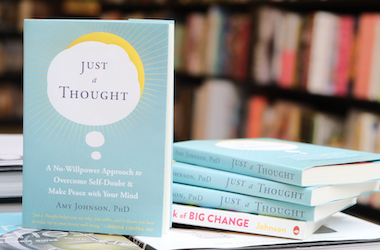The world is full of good ideas and nice people who are happy to share them.
Bumper sticker phrases. Instagram memes. Pop song refrains.
- There is only now.
- Let it go.
- You are perfect.
- Spend time in silence.
- It’s all in your head.
- Forgive and forget.
- Serve others.
These good ideas might point out something you hadn’t thought of, or remind you of something you already know. They might be a portal into a quieter mind. But as impacted as you may have been by quotes, songs, and good ideas in your life, have they had a lasting impact?
Good ideas show up, help in the moment, and then slip through the cracks without a deeper framework to support them and bring them to life.
Take “forgive and forget”. Excellent idea. Everyone knows that forgiveness feels better than resentment; that forgiveness has nothing to do with the other person and everything to do with us freeing ourselves from emotional dead weight.
But without a bigger understanding of where our experience comes from, forgiveness can feel impossible. It feels forced, false, and begs questions like “How am I supposed to forgive?” or painful misunderstandings like “I can forgive but I’ll never forget” or “They don’t deserve forgiveness”.
A good idea like forgive and forget is an outside-in struggle without a deeper understanding of human life. It’s a band-aid applied to a bullet wound.
And with a deeper understanding of human life, the good idea to forgive and forget isn’t necessary. We see that there’s nothing to forgive so forgiveness is not a struggle or an action to take. We “forget” because we live in the natural flow of life; when we aren’t tethered to memories, forgetting, letting go, and moving on happen naturally.
We don’t do them, we just live them.
Without a grounding framework for how life works, good ideas come and go like any other helpful thoughts.
With a grounding framework for how life works, we can appreciate good ideas for what they are—helpful thoughts in the moment—but we don’t need them as action steps or perspectives.
There is a clip of an interview with Chester Bennington that’s been shared online by millions of people this week. Chester is the incredibly talented Linkin Park singer who took his own life a week ago today.
His wisdom shines so brightly in what he shares in this interview.
Chester talks about his struggles with depression, referring to his own head as a “bad neighborhood”. He gets that his thoughts are his only real obstacle, and he talks about how service and focusing on others help him get out of his own head and find a bit of peace.
These are incredibly good ideas. They are full of wisdom, truth, and common sense.
But these good ideas didn’t help Chester last week, when death looked like his only option for a little peace and quiet. Without a secure grounding in how life works, these good ideas have nothing to stick to.
What if he had known that beneath the suffering, memories of abuse, and depressed feelings there is peace and contentment? Knowing this as a good idea doesn’t do the job—but what if he saw it as a fundamental, never-not-true part of the human design?
What if he had seen—as a Principle that governs human life, no exceptions—that we are the pure consciousness within which thoughts and feelings show up?
And if he knew that whatever was showing up—depression, physical pain, anxiety, fear—was not us or ours?
What if he knew that thought arises not from outside pressure or trauma, but from loving spiritual energy taking impermanent form within us? If he had that grounding, knew it as a non-negotiable part of the human blueprint, would that have made a difference?
Would it have allowed him to wait for the suffering to naturally ease up this time, as he had so many times before?
Would it have allowed him to identify with his human experiences a bit less, glimpsing the truth of what’s always there for us beyond and before our human experience a bit more?
We can’t know for sure.
What I know for sure is that the understanding that there are reliable Principles that explain all human experience has allowed countless people all over the world the opportunity to wait out the storm.
Deeply knowing that there is a kind, intelligent system at play gives us the opportunity to bounce back to home base. To take the storms less seriously because we know how storms work.
It’s far better than a set of good ideas that bring temporary comfort. It’s a consistent, reliable system that makes life make sense.
That’s what’s missing for so many of us. And that makes all the difference.






